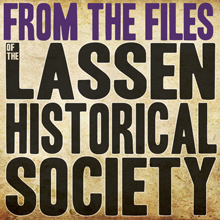

by Susan Couso
In 1932 Orville and Isola Stoy homesteaded 80 acres of barren, basically unusable land where the highway from Quincy meets the highway to Reno. As far back as the 1850’s the area had earned the name, ‘Hallelujah Junction’, as emigrants rejoiced at sighting the low Beckwourth Pass and the easy trip beyond to ‘California’.
After all of the trials and tribulations of the mountains and deserts, they were almost there!
Orville built a tiny hand-pump gas station to provide for the 1932 version of these travelers, and the stop’s popularity began to grow. In 1935 the Stoys added a circular dance hall to attract business, and by 1940 the property also included a bar, hotel, and restaurant.
A fire destroyed the home and gas station in 1938, and during the rebuilding process they added a lounge to the dance hall.
Orville grew weary of the work involved in running the Hallelujah Junction station, and finally decided to move to Eureka and lease the business out. It was a great relief.
But in 1945 fire once again struck. This time, the dance hall and lounge were destroyed.
Harold A. Stoy, Orville’s son, and his wife, Doris, were living in Tuolumne at the time, but came back to help Orville rebuild his business once again. About five years later, the younger Stoys bought the business from Orville, and immediately began improvements. Orville moved to Truth or Consequences, New Mexico.
The new improvements included an airstrip and two hangars which created ‘Hallelujah International Airport’. The airstrip was described as one of the longest and bumpiest airstrips in the country. It had been created from an abandoned section of the old Feather River Highway.
The Stoys had a four-seat white Cessna Skylane airplane of their own, but the ‘international’ part of the airport was created when a couple of pilots from Mexico landed at the strip.
The busy intersection was also isolated. Harold Eugene Stoy, Harold and Doris’ son, gained notoriety because he attended school in Reno, and had to make the long trip every school day.
In 1955 a uranium strike brought great promise, but soon ‘panned out’. There just wasn’t much to entice newcomers to Hallelujah Junction.
Then in 1967 the nearby Lassenite Industries pozzolan mine sparked interest in the area. The mine and processing plant, conveniently located next to the railway line, was expected to employ between 41 and 55 men and have an annual payroll of $275,000.00. Of course, everyone soon learned that most people would rather live in the Reno area than at the isolated junction.
By 1971, Harold Stoy, worn out from the work, sold to Charles and Laura Armstrong, before moving to Doyle.
In 1973 the State of California purchased the property in order to build a new $5.7 million four-lane freeway. The buildings; bar, hotel, home, hangars and everything was sold for as little as $1.00 each. Hallelujah Junction was no more, and very little remained of the business venture that did so well.
American composer John Adams, who reportedly has a cabin nearby, wrote a composition inspired by the area. It is aptly titled “Hallelujah Junction” and has been widely acclaimed. The piece was used for a ballet with choreography by Peter Martins. Today, you can find several versions of the composition on YouTube.

If you are a fan of our weekly history stories you should join the Lassen County Historical Society! It’s a fun way to be a part of our county’s rich history. When you sign up, you’ll receive regular Historical Society newsletters with interesting stories and information. Membership is open to anyone with an interest in area history.
Through your membership you help preserve local history. You can download a membership application by clicking here.






